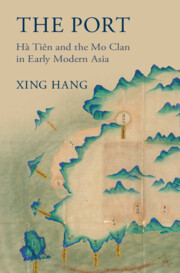Book contents
- The Port
- The Port
- Copyright page
- Contents
- Figures
- Maps
- Acknowledgments
- Additional material
- Introduction
- 1 The Port before “The Port”
- 2 Managing Hybridity
- 3 Situating Space through Verse
- 4 Ambiguous Associations
- 5 A Port with Many Faces
- 6 The Business of Business
- 7 Clash of the Titans
- Conclusion
- Glossary
- Bibliography
- Index
6 - The Business of Business
Published online by Cambridge University Press: 21 November 2024
- The Port
- The Port
- Copyright page
- Contents
- Figures
- Maps
- Acknowledgments
- Additional material
- Introduction
- 1 The Port before “The Port”
- 2 Managing Hybridity
- 3 Situating Space through Verse
- 4 Ambiguous Associations
- 5 A Port with Many Faces
- 6 The Business of Business
- 7 Clash of the Titans
- Conclusion
- Glossary
- Bibliography
- Index
Summary
Under Mo Tianci, The Port continued to thrive as a resource exporter, emporium, and monetary center. In fact, it expanded beyond its immediate surroundings of the water world and Cochinchina, stimulated by commercial growth, social change, and official policies within the regional powers of China, Japan, and the VOC. As a result, The Port played an essential role in the offshoring of the Chinese economy, attracting surplus laborers from China to Southeast Asia and supplying them with goods from Guangzhou. The Port’s expanded jurisdiction after the late 1750s also allowed for a greater specialization of functions. Bassac and other minor ports handled trade with maritime East Asia and received support from the Hong merchants of Guangzhou. The urban center focused more on finance, influencing the money supply of Cochinchina and becoming a center for copper and silver in Southeast Asia. The Port’s fortunes got a further boost when the fall of Ayutthaya to the Myanmar forces removed a major competitor along the Gulf of Siam littoral.
Keywords
- Type
- Chapter
- Information
- The PortHà Tiên and the Mo Clan in Early Modern Asia, pp. 204 - 236Publisher: Cambridge University PressPrint publication year: 2024

